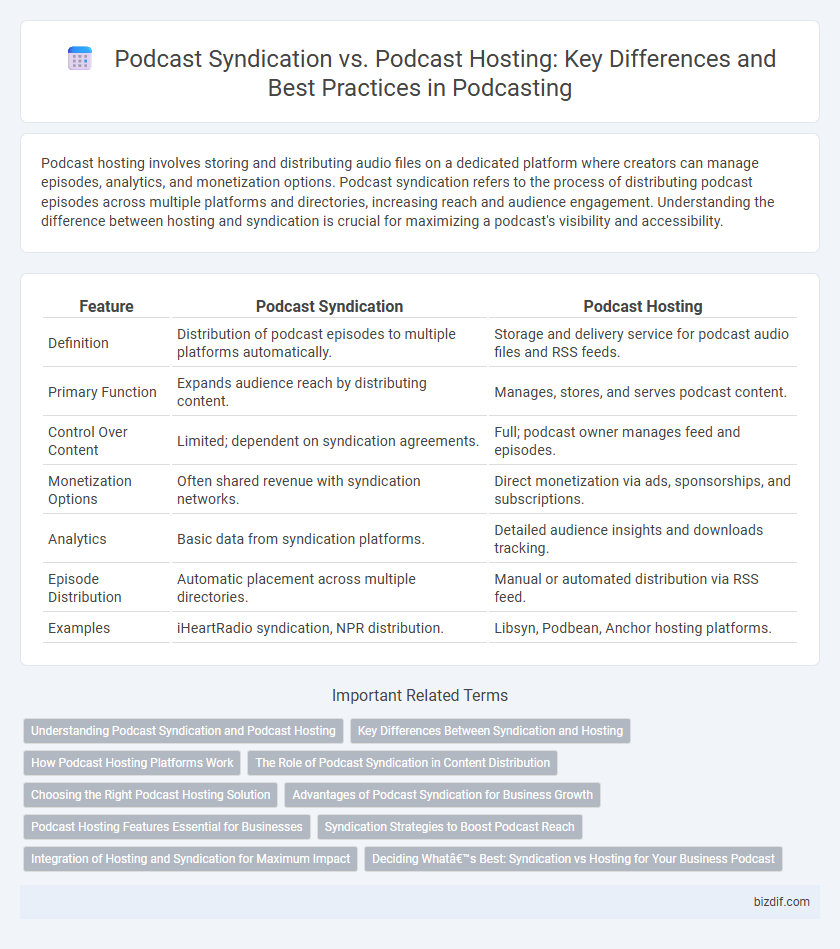Podcast hosting involves storing and distributing audio files on a dedicated platform where creators can manage episodes, analytics, and monetization options. Podcast syndication refers to the process of distributing podcast episodes across multiple platforms and directories, increasing reach and audience engagement. Understanding the difference between hosting and syndication is crucial for maximizing a podcast's visibility and accessibility.
Table of Comparison
| Feature | Podcast Syndication | Podcast Hosting |
|---|---|---|
| Definition | Distribution of podcast episodes to multiple platforms automatically. | Storage and delivery service for podcast audio files and RSS feeds. |
| Primary Function | Expands audience reach by distributing content. | Manages, stores, and serves podcast content. |
| Control Over Content | Limited; dependent on syndication agreements. | Full; podcast owner manages feed and episodes. |
| Monetization Options | Often shared revenue with syndication networks. | Direct monetization via ads, sponsorships, and subscriptions. |
| Analytics | Basic data from syndication platforms. | Detailed audience insights and downloads tracking. |
| Episode Distribution | Automatic placement across multiple directories. | Manual or automated distribution via RSS feed. |
| Examples | iHeartRadio syndication, NPR distribution. | Libsyn, Podbean, Anchor hosting platforms. |
Understanding Podcast Syndication and Podcast Hosting
Podcast syndication involves distributing podcast episodes across multiple platforms to maximize audience reach, while podcast hosting refers to the storage and management of audio files on a dedicated server. Hosting providers like Libsyn or Anchor offer bandwidth and analytics, enabling creators to upload and organize content, whereas syndication uses RSS feeds to deliver episodes automatically to directories such as Apple Podcasts and Spotify. Understanding the distinction helps podcasters optimize content visibility and maintain control over technical aspects of distribution.
Key Differences Between Syndication and Hosting
Podcast syndication involves distributing your podcast episodes to multiple platforms like Apple Podcasts, Spotify, and Google Podcasts, increasing reach without managing individual platform uploads. Podcast hosting refers to where your audio files are stored and served, providing essential metrics, storage, and bandwidth to deliver episodes efficiently. Hosting platforms generate an RSS feed, enabling syndication by pushing your content to directories for broader audience access.
How Podcast Hosting Platforms Work
Podcast hosting platforms store and manage audio files, provide RSS feed generation, and deliver episodes efficiently to various directories like Apple Podcasts and Spotify. They offer analytics tools to track listener demographics, episode performance, and engagement metrics, enhancing content strategy. Unlike syndication, which distributes existing feeds, hosting platforms serve as the origin point for podcast publication and distribution.
The Role of Podcast Syndication in Content Distribution
Podcast syndication plays a crucial role in content distribution by enabling podcasts to reach wider audiences through multiple platforms and directories, increasing visibility and listener engagement. Unlike podcast hosting, which stores and manages media files, syndication involves distributing the podcast feed across various channels such as Apple Podcasts, Spotify, and Stitcher. This strategic dissemination ensures seamless access and maximizes the podcast's exposure across diverse listener bases.
Choosing the Right Podcast Hosting Solution
Selecting the right podcast hosting solution is crucial for effective podcast syndication, ensuring seamless distribution across multiple platforms like Apple Podcasts, Spotify, and Google Podcasts. Podcast hosting services provide the essential storage, bandwidth, and RSS feed generation needed for reliable content delivery and audience growth. Evaluating factors such as analytics, monetization options, and ease of integration helps podcasters maximize reach and listener engagement.
Advantages of Podcast Syndication for Business Growth
Podcast syndication amplifies business growth by distributing content across multiple platforms, significantly increasing audience reach and brand visibility. This strategy enhances SEO through backlinks and keyword-rich descriptions, driving organic traffic to the business website. Syndication also facilitates audience diversification, allowing businesses to tap into new markets and expand their customer base efficiently.
Podcast Hosting Features Essential for Businesses
Podcast hosting platforms provide essential features for businesses, including unlimited storage, reliable bandwidth, and detailed analytics to track listener engagement and demographics. These hosts also offer seamless distribution tools, enabling automatic syndication to major directories like Apple Podcasts, Spotify, and Google Podcasts. Secure content management and customizable branding options help businesses maintain control over their audio assets while enhancing brand visibility.
Syndication Strategies to Boost Podcast Reach
Podcast syndication involves distributing your podcast episodes across multiple platforms and directories to maximize audience exposure, unlike hosting which focuses on storing and serving your audio files. Effective syndication strategies include submitting your podcast to popular directories like Apple Podcasts, Spotify, and Google Podcasts, as well as niche platforms that target your specific audience. Leveraging RSS feed optimization and cross-promoting on social media channels can significantly enhance podcast reach and listener engagement.
Integration of Hosting and Syndication for Maximum Impact
Podcast hosting platforms store and distribute audio files, ensuring reliable access for listeners across multiple devices. Podcast syndication enables automatic distribution of episodes to various directories like Apple Podcasts and Spotify, amplifying reach and audience engagement. Integrating hosting and syndication streamlines content management, maximizes discoverability, and optimizes monetization opportunities for podcasters.
Deciding What’s Best: Syndication vs Hosting for Your Business Podcast
Podcast syndication distributes your episodes across multiple platforms, increasing reach and discoverability without requiring separate uploads. Podcast hosting provides centralized storage, analytics, and control over your content, ensuring consistent branding and monetization opportunities. Choosing between syndication and hosting depends on your business goals, desired audience engagement, and technical preferences for content management.
Podcast syndication vs podcast hosting Infographic

 bizdif.com
bizdif.com